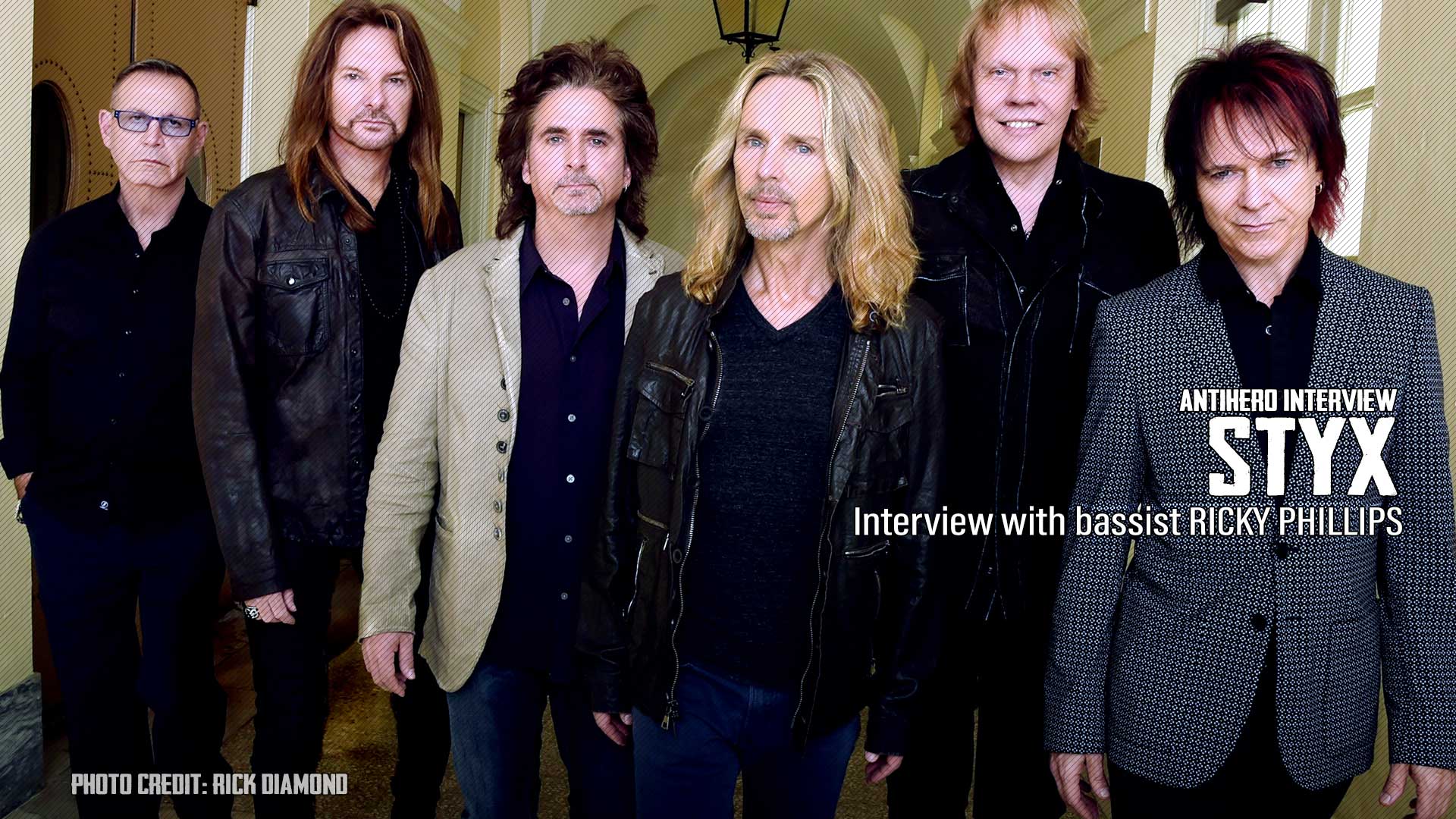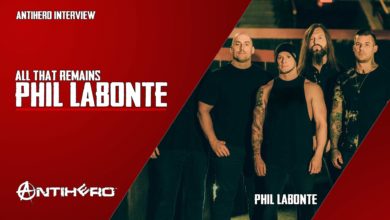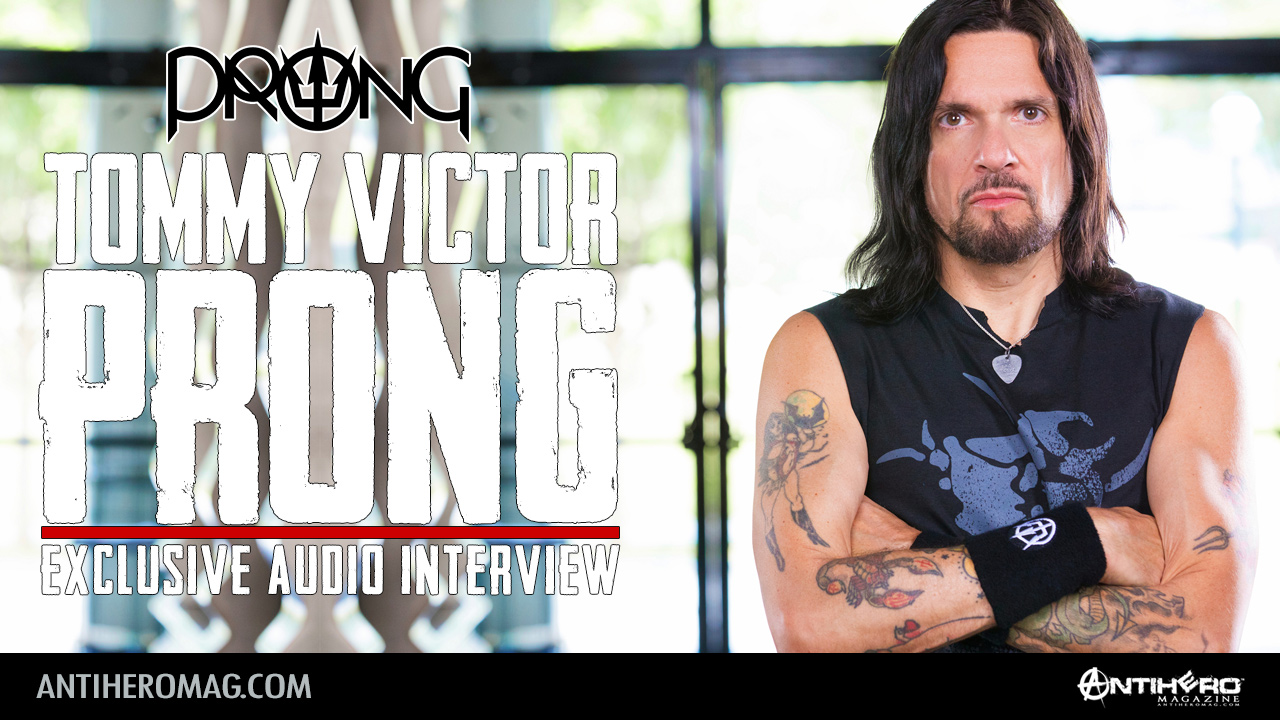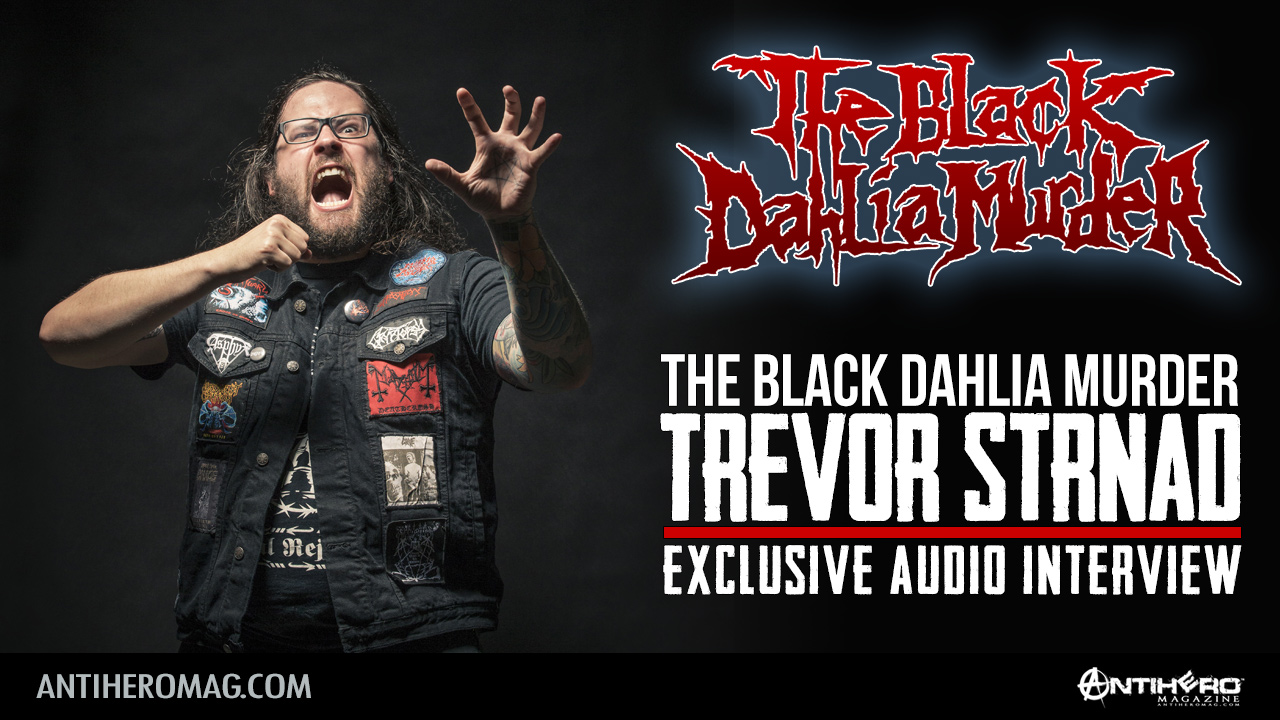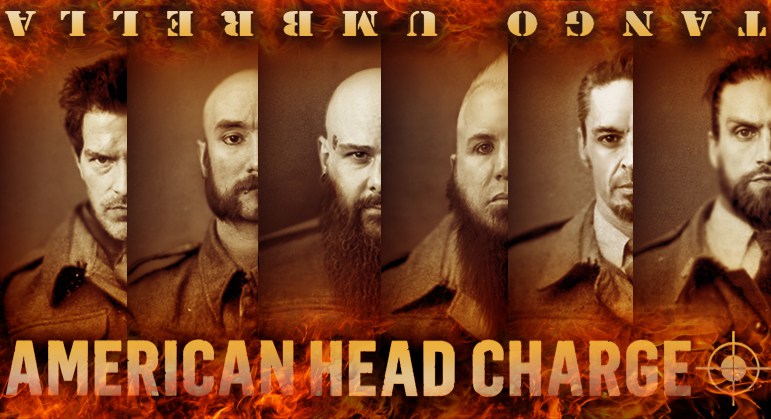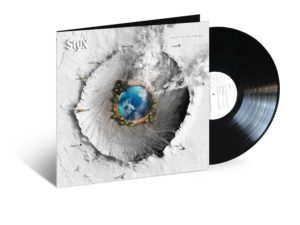 A new era of hope, survival, and prosperity comes calling with the release of CRASH OF THE CROWN, STYX’s new studio album, which was written pre-pandemic and recorded during the trying times of the pandemic.
A new era of hope, survival, and prosperity comes calling with the release of CRASH OF THE CROWN, STYX’s new studio album, which was written pre-pandemic and recorded during the trying times of the pandemic.
The legendary rockers–James “JY” Young (lead vocals, guitars), Tommy Shaw (lead vocals, guitars), Chuck Panozzo (bass, vocals), Todd Sucherman (drums, percussion), Lawrence Gowan (lead vocals, keyboards), and Ricky Phillips (bass, guitar, vocals) will release their 17th album June 18 on the band’s label, Alpha Dog 2T/UMe, which will be sold as clear vinyl, black vinyl, CD, and on digital platforms. Fans can pre-order it here and at Styxworld.com starting Thursday, May 6.
Outside of Styx Ricky has a long-established musical pedigree with acts such as Bad English, Coverdale-Page, and Ted Nugent. Had the recent opportunity to chat in-depth with him regarding all things music and also a few other things besides. I even found out that we share the same favorite Bad English song and it’s not one of their big MTV-era hits.
Ricky Phillips: Hey, Mark. How are you?
ANTIHERO: I’m good, man. How are you?
Ricky Phillips: I’m doing well, I’m doing well, thanks.
ANTIHERO: How have the global events of the last year impacted you professionally and maybe personally?
Ricky Phillips: Well, good, bad, and ugly, actually. It’s been good for getting a lot of things done. You ever say to yourself, “I wish I could stop the world for just one week so I could get caught up.”?
ANTIHERO: I know exactly what you mean.
Ricky Phillips: Well, we stretched that. I remember getting off the airplane in Philadelphia last year at the end of February, beginning of March, yeah it was the end of February. And before I could get to baggage claim, management was calling me saying, “Grab your bags, they’ve shut down the Eastern Seaboard, you’re going home.” So now, here we are over a year later and we’re about ready to dive, to get back in the game and we’ve got shows that start in about two and a half weeks from right now. We’re out through December, we’ve got quite a few shows between now and then.
So it’s affected me. I’ve been able to get a lot of writing done, a lot of recording done in my home studio. Personal things that I just, really because we tour so much and we live on the road, when we are up and running, that a lot of household things, gardening, playing golf, which I love, I never have time for. It’s been like a little mini vacation. My lady is a nurse, and she had some hardcore times during the thick of COVID at the hospital where she works. But we stayed sequestered and had our own little drill around meals and watching movies and doing stuff, and then in the daytime, we’re both working away. So, it’s been interesting to be home this much, and I’m sure she can’t wait until I get back out there in a few weeks.
ANTIHERO: Yeah, you mentioned music, it’s has given you a lot of time to create music. Was this all Styx-related music or maybe other musical projects that you’ve got lined up?
Ricky Phillips: Yeah, I never know what I’m writing for until it’s honed in about three-quarters of the way. I just get song ideas all the time. I’m always picking up my phone and grabbing the closest guitar. It’s been easy for that, on the road, you’ll see every one of us in the Styx band, in our dressing rooms, we all have our little warm-up practice gear, and we’re grabbing our phone and recording a little tidbit that we just came up with. So, weeding through a lot, so many ideas, little tidbits, some more complete than others, listening to some and saying, “No, that’ll never work,” and erasing it, and then archiving a lot of cool stuff.
So, some of this stuff, I’ve definitely put a little checkmark on for Styx. Some of it is just for, I’ve always wanted to finish a solo record, and I don’t know if I ever really will, to be dead straight with you. But I’m always hoarding some songs if and when I really would have the time to do that properly and put a little supergroup together or something. To go in the studio and really put something down that really reflected me. I’ve got to start on that.
Then I write stuff all over the map because I’ve written for everything from children’s television to heavy prog-rock type music. It’s just one day, it’s this, and one day, it’s your mood, you’re feeling whatever emotion you come out with. I’m driven by emotion with the way I write. I don’t really try to build a house as some artists do. I’m not really interested in that. It’s always driven emotionally. Sometimes I’ll come across a riff and think, “Wow, it must’ve been a pissed-off day that day.” But I love it, and I love the inspiration side of creativity, where it can take you, what kind of a flower you can grow, or cactus. It’s something that I’ve admired in a lot of my favorite writers, and music, and bands since I was a kid.
ANTIHERO: Of course, Styx has got a new album out next month. How was that written? Was it written before the pandemic, or was it written maybe during it?
Ricky Phillips: That is a really good question, that I’m probably going to start being … It sounds like it was written after COVID, and then the effects of COVID. It’s very prophetic in that regard, but in all honesty, a lot of the ideas, I would say the lion’s share of the ideas came before COVID. It’s just crazy how so many songs relate to, even politically, you could say, but has nothing to do with anything that transpired through the COVID era that we all have found ourselves in the midst of. These ideas just seem to have come out of nowhere and then can be shadowed by actual events.
ANTIHERO: What about, you mentioned you’ve got some live dates booked then for Styx. What proportion of new tracks will you be showing in the live dates? I guess it’s very difficult for a band like Styx because fans obviously want to hear all the hits. Is it difficult to introduce new songs into a live set?
Ricky Phillips: Well, we’re not going to bang people over the head with new material. I don’t think it’s a wise thing to do, but we will definitely … We already have ideas of what may work and where, and when. There’s a real art form to putting together a setlist, and I think it’s one of the things that, because Styx has so many decades of songs that people want to hear there, we sometimes do, in a big theatre, we’ll do two-set shows. Those are my favorite because we can do more. We can do two complete sets, take an intermission, come back, do the second one. You can really build an arc of the Styx legacy that way. Going out and trying to introduce Crash of the Crown is going to be, well the songs are very progressive, and a lot of different odd time-signatures, sometimes within the same song. Movements that go from soft and light, to suddenly heavy and hard.
But with all the Styx harmonies, it’s really, to me to watch, see the progression, even The Mission, which was the last record we did, songs off of that, people are holding up signs wanting to hear. But we have to be careful because that’s a small percentage really of the audience. Most of the audience is wanting to hear new things, but they haven’t heard it enough to where we should abuse them with, “Hey, look what we’ve done lately here.” Because you need to give an audience time.
So, we will probably just sparsely, maybe walk out to something from the record, and then play something in the middle. Maybe if we do multiple encores, we may do something. But for the most part, we really are there to, not just please the audience, please ourselves, but to put on a show that we leave no stone left unturned. We really know how to craft a setlist that will ebb and flow with the emotion. You can carry people so far, and then let them come back down a bit, then take them up a little higher. We take pride in that. So, it’s a little intricate, and I hope I haven’t made it sound too complex, but we’re going to be, probably, fairly reserved at first, and then we’ll see how far this goes. At some point, as we did with The Mission, we may do shows where we do the entire record as it was recorded, which will be a lot of fun.
ANTIHERO: Obviously, you’ve been in Styx now for quite a while. You’ve made your musical name prior to Styx. Was it difficult for you, initially, going into Styx as the new guy, and in terms of stamping your own little creative bit to the Styx brand, as it were?
Ricky Phillips: That’s a really good question. Looking back on it, I have always had a friendship with Tommy Shaw. When I was in The Babys, years and years ago, we toured with Styx. Tommy and I became friends, it would be 1979 when he was in Damn Yankees, I was in Bad English. So we would be at events or award shows or whatever, and we’d always gravitate towards one another, and we maintained a friendship that way. So, when Chuck Panozzo was unable to do complete sets and had health issues, which is no secret, it’s even in his book, I came in to do a little bit more of the heavy lifting, but Chuck is now quite healthy, and we bring him out in various places in the show, he’s able to play. Plays great still, he’s just not able to do an entire set, but he’s a big part of the brotherhood. The band was started by him and his twin brother, Johnny, who passed away in the ’90s.
So, Styx has really been faithful to those who have been positive influences. They had to make drastic moves in the history of the band, there are many things that have happened, but they’ve been very careful to keep the band alive, keep it moving forward. I’ve always, from afar, noticed that, but now, here in September, I’ll start my 19th year with the band. That just blows my mind. I can’t believe it’s been that long, and I would’ve never guessed that when I was touring with them back in 1979, that if someone said, “Yeah someday you’re going to be in this band,” I would just laugh at them.
But here we are, and Tommy just asked me if I would be interested at that point. From Bad English, David Coverdale asked me to do the Coverdale-Page record, help them record some songs, is how it started, and then I worked with Ronnie Montrose. As a matter of fact, I was still working with Ronnie Montrose even after I joined Styx for a while, and then it just became impossible. But of all the things I’ve been able to do, and other tours that I’ve been able to do in between with various bands, I never would have predicted this, but here I am. And all these years into it, and very impressed by Styx, the integrity. I had no idea how driven and how many areas of what they do they very masterfully have… It’s not management who makes the moves in Styx, it’s the members of Styx, and I’m very impressed.
I’m also impressed with the management. The management knows where their strengths are and don’t get in the way of that. It’s a really incredible organization of guys who love music and who love moving forward. Hence, Tommy Shaw, this new record, not wanting to take a chance and move forward and not just write a bunch of pop tunes, that sound like Styx and rest on their laurels. This is the most forward record I’ve ever heard. Well, I, that I’ve heard in a long time, actually from any band, and I applaud Tommy Shaw for really leading the charge on this one.
ANTIHERO: You’ve been a professional musician for many years. You’ve seen a lot of changes in your time. Obviously, you’ve lived through those Damn Yankees, Bad English, that successful MTV era. Do you find it a better place for musicians these days, where you’re more hands-on, in terms of your own career, and you’re not pretty much run by record labels, or have them basically dictate to you?
Ricky Phillips: That’s a great question too. Boy, you’re coming up with some good ones. I think so. I think you’re right. It’s a shame that the reason for it is because there’s not as big of market share, but that’s what it comes down to. Bands these days, there’s not enough money out of having that army of people behind you, wrong or right, but making decisions for you, rather than you making them yourself. So, the survivors of today really seem to be those who are able and have all of the wherewithal, the skills to know how to navigate a crazy business, find out where you can play, what’s left, what’s open, and how to keep an audience interested and wanting to buy that ticket to come to see you, because the record business had washed away for a while there.
It seems to be there are flames here and there popping up of things that are catching on. I did, I produced the last recordings of Ronnie Montrose, and we went from 180 on the rock chart to 11 within a week. And the tragic death of Tom Petty released a whole flood, flooded the market with Tom Petty and a lot of us and the few other bands that were quite good at the time. That was it. There wasn’t enough room. So we withered and went away as did many other bands.
The marketplace that predicts a lot of these moves you’re referring to, that record companies won all that money. They wanted all that money. And there were a lot of record companies that made good moves and a lot that didn’t make such good moves, and we witnessed all that. But here we are now at a point where with COVID and with, with the decline really of rock and roll since the early ’90s, that it’s just a different day. So, we’re fortunate enough to have a great management team, very seasoned, well-educated, intelligent band members who are very involved and know exactly what has worked in the past and what hasn’t. So, we’re lucky, we’re very fortunate to be where we are.
ANTIHERO: You have played with many musical legends from The Babys, right through, Bad English, Ted Nugent, et cetera. Which musician have you played with that’s actually personally taught you the most?
Ricky Phillips: That has personally taught me?
ANTIHERO: Yeah, that you’ve learned from.
Ricky Phillips: Who I’ve learned from? I would say John Waite was very influential as a guy who knew what he could do and stayed within his lane. He ventured out, I don’t want to make it sound like he wasn’t experimental, very experimental, he could sing just about anything. But he knew what he could put over and people would love and believe in, right down to the songwriting. He was very … Jonathan Cain was there at the same time, of course. So, Jonathan, who wrote all those huge hits and has made millions of dollars off of all this big Journey hits he wrote with Steve Perry. That was a different craft. I wasn’t about that craft. I am actually in a way, to be honest, I do like writing well-crafted songs. But my heart, my gut is about, little more about emotion. And I learned a lot from John about sticking and following emotion.
Neal Schon, when I worked with him in Bad English. Neal, I would for a while, Neal and I were writing and my studio in Los Angeles, and he would write, he would come to my house at 10:00 in the morning. He would have left my house at 10:00 the night before, but he’ll come back at 10:00 in the morning with five new song ideas. And he was probably the most prolific idea-man, not completely written songs, but really big pieces that could and would lead to big songs. It was astounding. He did it day after day.
I think working with Jimmy Page and David Coverdale, helping them record some of the songs that they did on the Coverdale-Page record, it was easy breezy, walk in the park, they just know what they’re doing. They know exactly what their strengths were. They stayed within it. That was a very cool time for me. Everything I wrote after that for a year sounded like Led Zeppelin.
ANTIHERO: I wonder why.
Ricky Phillips: Almost too influential on me. But I think I could go on, I’ve learned something from so many people along the way, that you just … What I think I’ve gleaned from all of it, is stay true to yourself. If you want to write your best stuff, write all the time, and stay true to what is driving you that day or what, the way you’re feeling, follow a mood, follow an idea, follow something you heard on the news that pissed you off. Follow something that makes you have emotion. And you’re going to be okay.
ANTIHERO: For me personally, that whole MTV era, the ’80s, is when I really got into rock music. I just wanted to ask you briefly about Bad English. Initially, when that project got together, was it designed as a short-term musical thing? Or purely the circumstances of the time that dictated that it became so?
Ricky Phillips: Us splitting up was totally forced within the band. Not getting along, too many cooks, too many people wanting to get their way, nobody willing to bend. People who, when we first started that band, it was incredible, because there was so much talent in the room at all times. You couldn’t keep up with all the great ideas coming. It was so easy to have a number one song on the first record. It was so easy to have six songs in the top 40 of that first record. It was like, it happened so fast. I really liked the second record better, because there’s so much tension. And there, it had, even the happy songs sound dark, it just had something cool about it.
But by the time we got into mixing, I was the only one that was at the mixes every day with Mike Frazier who did an incredible job of mixing that second record. But John Waite, and I wrote a song with a buddy of mine, Jesse Harms, called Time Stood Still. That was the only song that got airplay. It really only got airplay in Europe… they didn’t even release it. There was so much money spent on Bad English at that point, the record company didn’t even really release anything to radio from that record. They just said, “That’s it, pull the plug.” Which is a shame, because it was really a good record, but it never really got its day in court.
ANTIHERO: I was going to actually say that “Time Stood Still” was actually my favorite track on that particular release.
Ricky Phillips: Oh, that’s a nice surprise. Thank you.
ANTIHERO: Seriously. That’s the one that I always go to, in years to come and I go back to the album, that’s the one I hit first. I know it’s not the first track, but yeah, that’s what I always go to.
Ricky Phillips: Well, I have to agree with you. I think that I had Ron Nevison saying, “Come on, Ricky, get in here, you’re not really contributing to this record, blah, blah, blah.” And I was stuck, because I didn’t, they were working with so many team writers, and I don’t like it, I’m not about that. I don’t do that. I like to have the ideas come within the band, always had. So, I had a buddy of mine, matter of fact, he was living with me at the time at my house. Because he was homeless in San Francisco. And he was writing a lot with Eddie Money and some other people. So, Jesse, I brought, I said, “Jesse, I’ve got a few ideas. Let me bring John Waite in, let’s see what we can come up with.”
Jesse pitched his first idea, and I could see that it was not going anywhere with John. And then I said, “You’ve got anything else?” Because I was about to throw in my 2 cents and he said, “Well, I’ve got this title, but I don’t know where to go with it. And it’s called Time Stood Still.” Well, we both went, “Well, okay, I like that.” And boom, we started playing, and within, I believe less than an hour, the song was written, maybe two hours to complete the lyrics. It just came out. I had a guitar. Jesse was sitting at a keyboard, and we recorded the demo there on the spot. And I played a little flamenco guitar intro thing that I knew Neal would tear up, which he did on the recording. We just pretty much mimicked the demo, with our band, of course, with Deen on drums and with Jonathan on keyboards. It was one of the most rewarding co-writes I’ve ever done.
ANTIHERO: Yeah. Beautiful song.
Ricky Phillips: Thank you, man.
ANTIHERO: When you create something like that or the hits, like “When I See You Smile”, do you guys, as musicians, get those hairs on the back of your neck, “We’ve done something special,” or is it only subsequently, when it takes off, when it becomes in the public domain, that it becomes apparent how good the song was.
Ricky Phillips: It’s funny because sometimes, yes, but there have been songs. There was a song, what was the song called? Oh, shoot. I’m going to forget the name of the song. There was a song on a Babys record, on the Union Jacks record, that we wrote that we even played live a couple of times before it had even been recorded. Oh, True Love True Confessions. And it would drive audiences crazy, and they’d never heard it before. It was one of those first-listen-type songs when we went in and recorded it. I don’t know if we realized that at the time, but we did after the fact, when it was too late, it just didn’t have the juice. It didn’t have a special quality. For some reason, we got, probably, too consumed in the technical side of recording and just expected it to have that same emotion that we did live.
And it didn’t, we didn’t capture it. We missed it; we missed the bullseye. And the song didn’t even really get its day in court as a single, the record company said, “Nah, that’ll never make it.” And they were right. So sometimes you … Time Stood Still? Yes. That made the hair on the back of my neck stand up. When it was done, I knew that was good. We hit the mark we were going after. There are certain other songs that I can recall doing that as well, but it can go either way.
ANTIHERO: For many people, the bass that you play and drums, it’s the heartbeat of a band. It’s the connection between the bassist and the drummer. Who’s the best drummer? Or the one that you’ve connected best with that you’ve played with?
Ricky Phillips: Well, probably Todd Sucherman. He’s an extraordinary drummer. I had no idea. I met Todd before I was in Styx. I went to do a session, and I wasn’t feeling well. I remember I had a cold or something, and I was setting up my gear in the control room. Because I was just going to cut tracks inside the control room while the drummer was out. Then I heard him tuning up his drums. And I said to the producers, “Is this the drummer on this session?” He said, “Todd Sucherman, he’s the drummer in Styx.” And I’m like, “Oh, I’ve been hearing about this guy.” So you can tell, even though he was just tuning up his drums when a guy hits the drums, and what he plays, you could tell, as a bass player, if the guy’s worth the salt and I could tell right away, “This guy was going to be good.”
And we cut this guy’s record, and I’m not making this up, we cut this guy’s record in a day, in one day. We had never met, and we clicked so well together that we had bass and drums, basic tracks, and actually a lot of the guitars too in one day. We did come back and listen back to the material, and Todd and I decided let’s recut this one song. So, we did recut one song the following morning, but it was a lovefest between Todd and me. Then when Styx was asking me to join the band, he was the one who actually called me. He said, “Oh, let me, can I call him first?” And so, Tom is calling me and he said, “Man, I didn’t know that you were at the top of Tommy and JY’s list,” and blah, blah, blah, blah, blah. And he said, “What do you think? Like, what are you doing?” And he said, “Tommy is going to call you in a minute. I asked if I could be the first one to call.”
And that’s what you want. There is that special thing, as you were just saying, between a drummer and a bass player. If you’ve got that, and you’re building the house on top of that structure, it’s probably going to have a pretty good success rate of being good, making whatever it is you think is worthy of putting on the racetrack, to begin with, it’s going to run the race. So that’s the strongest. I will say the second, Deen Castronovo I fought for him. We auditioned something like 30 drummers and I fought for him to be the drummer in Bad English, and so did Neal. At one point early on, we had sent him home and I said, “This is a big mistake. That guy’s world-class and has proven that he is.”
ANTIHERO: Not only his drumming ability but what a voice as well.
Ricky Phillips: I know.
ANTIHERO: Incredible.
Ricky Phillips: Ridiculous voice. And we didn’t know that. I think I was the first one to find out. I’d written a song for Fergie Frederiksen, who was no longer with Toto. He had just finished doing that Toto record and I’d written a song for Fergie, and I asked Deen to come play drums on it. And I said, “Can you sing this, Deen?” Because I knew he could sing. I heard his voice full-on, and I was shocked. I started the next day, I said, “Guys, we’ve amped up, we’re sitting on the best backup vocalist. This guy’s got a lead.” And they said, “What, Deen?” He just didn’t look like he would, and all of a sudden, we had him singing all over on everything. It was just tremendous.
ANTIHERO: Just a final one. This half an hour is absolutely flown by. I’m sure you’ve done many interviews over the years. If the rules were reversed and you could interview somebody, who would that person be?
Ricky Phillips: Oh boy, well, I can’t, it’s impossible, but I would have loved to have interviewed John Entwistle. I can find very few things, very few interviews, as a matter of fact, I think the first real interview of his that I read, the very first thing he said is, “Why are you talking to me? Nobody wants to talk to the bass player… go interview the singer, go interview the guitar player.” But John Entwistle is probably my absolute favorite. Paul McCartney of course is so underrated as a bass player. I learned a lot of melody and lines from him, but John Entwistle facilitates playing, and to play just absolutely the perfect thing every time, was astounding to me. Chris Squire, I had a great pleasure before Chris died, just a year and a half or two before he died to tour with him, with Yes, and to talk with him. I recorded, I produced something that I used Alan White on drums.
So, I had that in the inner pathway to be able to have lunch with those guys, and we’d hang out and I could ask Chris things/ then one day he said, he came up to me, he said, “Ricky, what are you playing through? It sounds very good out there.” And to have one of your heroes basically ask you that question alone, or just show interest was monumental to me. It was just the best thing ever. So here I am talking about, I’m going straight to bass players, but if all the people I can no longer, but I’ll add another one to the list. Jimmy Hendricks, I would have loved to have interviewed Jimmy Hendrix, because he was probably one of the biggest influences at 14 years old or whatever I was, 13 or 14 when I first heard him play.
I’d never heard anything like that, and that changed my world. So those are the kinds of people. I think people who have reached for something and attained it at the top shelf. Those are the kinds of people that I also find intriguing as human beings. Not really inspired by guys who are know-it-alls, and think they’ve … As a matter of fact, the whole onslaught of guitarists and bass players that just play a thousand notes a second, with really no passion and no meaning, just it’s a technical skill. I mean, that’s for running track or whatever. I liked guys that come up with melodies, whether it’s a singer or a player. And lyrical drummers, like Deen, I thought, was a lyrical drummer. Todd Sucherman is an amazingly lyrical drummer. He plays a lot, very technically plays, but he knows exactly where to put all of that. He makes there so much emotion that he is able to emit so that I can be the best bass player I can be, on top of it. So that’s the kind of stuff I like.
ANTIHERO: Yeah. Ricky’s been great. The time’s flown by. Didn’t unfortunately get to probably two more. But what it was like to work with Coverdale and Page, though you touched on that. I don’t want to ruin your schedule too bad.
Ricky Phillips: Well, if you have anything else you want to ask, go ahead. We’ve got a few minutes for me.
ANTIHERO: No worries. Just about as I said, Coverdale-Page thing, you played on a couple of tracks on the album. I just wondered, when did you first get the call? What was your reaction to be part of that musical experience?
Ricky Phillips: I got it right as that … We actually think we were maybe split up in Bad English. I’m not sure, but we had toured with White Snake. And so, when David called me and asked me to if I would be interested, he basically said, “Listen, we don’t know what we’re doing as a band.” They were, I think, trying to, I think Kalodner wanted them to do a supergroup initially. Then he said, “But we need some help with this material. Do you have the time? And could you come up and work with us?” And he said, “I got Denny Carmassi playing drums.” And Denny is this huge, great friend. And just one of my favorite drummers from the original Montrose. And he also played with Foreigner for a while, and just a really just a wonderful feel, real wonderful vibe. So I said, yes, of course. And then that led to us working …
The material is pretty much … I wrote all the parts for that record, and then we went up to record in Canada, and basically, Denny and I laid down all the tracks. And they didn’t really, I was a little concerned because Jimmy has a swagger to his playing. And I told Denny, I said, “Jimmy’s not really playing with us. And I have to ebb and flow with him, I’ve learned how to do it, because we’ve been doing this for months now, but I don’t know if this is going to work.” And he just gave me a funny look like, “Well, why wouldn’t it work?” But when they got down to it, Jimmy had bought a place in Florida, Southern Florida. So they ended up recording a criteria to do his overdubs, and it took him a year basically to do the overdubs.
He wasn’t, I guess, really motivated or whatever. But I started getting phone calls like that, I don’t know if he couldn’t match what was going on. We had really solid rhythm tracks. But as I said, there’s a charm to Jimmy’s playing. It really has to do with the swagger and the ebb and the flow of the vibe and the feel. And so they had a local guy, I talked to Kalodner and Kalodner said, “I’m not going to fly you in and put you up for a year for when Jimmy decides to come in and play.” They had, I’m blanking on his name, I should know his name, great bass player who was at the Miami Sound Machine. He would come in and learn my parts and put them in. But yeah, and then, in the end, there’s a couple of tracks I don’t get credit for, which are me, but maybe even vice versa, but it was just one of those things where we had such a blast putting that record together when we were all four working together initially.
It’s a really strong, good memory. And Jimmy and I, when he would come to, I’m not in Los Angeles and haven’t been for years, but when he would come down to LA, I’d pick him up at the hotel, and we’d go out and have dinner and hang. Just loved the guy, total, amazing, a great time with that guy. And David as well, David’s remained a good friend. We just, we don’t see each other very often, but that was a really, really wonderful little … As my band is diminishing, I get to go play with Jimmy and David, come on. It was a nice little relief for me.
ANTIHERO: What was that first rehearsal like, when you went down? There’s Jimmy Page and David Coverdale, and what tracks did you play?
Ricky Phillips: You know what, it’s funny, it’s short, it’s a short little story, but it’s a good one. I flew in and Denny picked me up at the airport in Reno. Then we drove up to Tahoe where we were working. They had to keep us away from everybody. And we’re having, we went to this Udon noodle shop, and we had some noodles and right while we’re eating, I said, “In one hour from right now, where we’re meeting Jimmy Page,” and he just dropped his spoon and he said, “Okay, thanks a lot, I’m not going to eat.” Because we’re both nervous. We were just, we had nerves. We’re going to meet Jimmy Page. We’re going to work with David and Jimmy, and we were excited.
So we drove over to this chalet that they had for us to rehearse it. And we walked in and were kind of, “Okay, here’s the drums.” He was checking the drums out and I was checking out the amp that they had for me. And all of a sudden, the door swings open, and it was Jimmy, a big beaming smile on his face. And he goes, “Hello, Lads. I’m so glad you’re here. Thanks for coming. This is going to be so much fun.” Walked across the room with his hand out and gave us a big hug and handshake. So any time somebody starts the beginning process of a project that way, you know it’s going to be a good time.
And it was it just every day, we worked really hard, Denny and I would start at 7:00 in the morning. Because we were both, we were staying in these really nice, oh, I don’t know what you would call it. It was a little resort area where they had us stay, and we would have coffee and we would go over what we’d done the day before, then we’d meet the guys at 10:00 or 11:00 in the morning. And we would work until generally 6:00, 5:00 or 6:00, and we’d all go someplace, find some great place to go eat, or sushi bar or something, and we do it again the next day. And we really got good work done. I remember Jimmy and David and I, one day we went to see Terminator Two at a theatre just to get away from it all, but it was generally just nose to the grindstone work, and it was a good time doing it.
ANTIHERO: Brilliant. Thank you very much for the additional time, Ricky. Okay. I’ve got to let you go. As I say, good luck with the Styx new release. Hopefully, you’ll get over to Europe and play some shows over here.
Ricky Phillips: That would be awesome. We can’t wait to come back. It’d be so much fun. And hopefully from your lips to God’s ears.
ANTIHERO: Thank you very much for chatting with me. Take care.
Ricky Phillips: Bye Mark, you take care.

